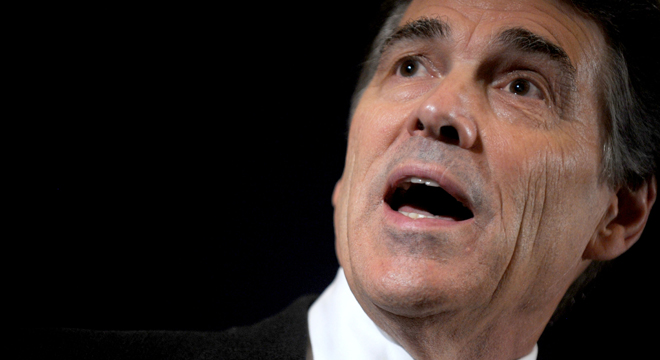Late on Friday Texas Gov. Rick Perry got the endorsement from a conservative Dallas pastor. It probably wouldn’t have been the most eventful development, except that Dr. Robert Jeffress has described Mormonism as a “cult.” And that just happens to be the religion of Perry’s chief rival for the Republican nomination for President, former Mass Gov. Mitt Romney.
Was it an attack? Perry’s spokesperson Mark Miner said no. “He [Perry] does not believe it is a cult,” Miner said after the governor personally accepted Jeffress’s endorsement and was introduced by him at the Values Voters Summit in Washington on Friday.
But will Perry’s new supporter help him within the GOP primary and possibly to the White House?
On the first point, Public Policy Polling (D) asked Republican voters in March of this year if being a Mormon was disqualifying for a GOP candidate. A relatively small amount, 20 percent, said yes, but the vast majority didn’t think so. That sentiment held closely across the ideological spectrum: GOP moderates, “somewhat conservative” and “very conservative” had very similar splits on the issue.
In the general election, both the Pew Research Center and Gallup took at look at the issue and came up with the same conclusion. Namely, being a Mormon isn’t going to single-handedly lose the election for a candidate. But it doesn’t help.
“A quarter of Americans say they would be less likely to support a presidential candidate who is Mormon, while 68% say it would not make a difference,” wrote Carroll Doherty, Associate Director of the Pew Research Center for the People & Press in a New York Times piece. “For perspective, about the same number say they would be less likely to vote for a candidate who has used marijuana in the past.”
Gallup found that 22 percent of the general population wouldn’t vote for a Mormon for a President, a figure that the polling organization has tracked since the 1970’s. Breaking out the data, Republicans were actually more likely to say they would have no problem voting for a Mormon, with 80 percent of the party faithful saying so. 79 percent of independents answered the same, along with 71 percent of Democrats, the lowest of the bunch. Gallup also pointed to the fact that opposition against a Mormon President has actually stayed the same for decades while opposition to other groups has partially subsided.
The stability in U.S. bias against voting for a Mormon presidential candidate contrasts markedly with steep declines in similar views toward several other groups over the past half-century, including blacks, women, Catholics, and Jews. The last time as many as 22% of Americans said they would not vote for any of these groups (the same level opposed to voting for a Mormon today) was 1959 for Catholics, 1961 for Jews, 1971 for blacks, and 1975 for women. As noted, opposition to voting for each of these has since tapered off to single digits.
But that data is for a general election. And even though Gallup showed that GOPers were most likely to support a Mormon candidate in November, Pew showed that it was a much tougher scenario for a Mormon to win the Republican nomination for President. From Doherty’s piece in the Times:
…an important group within the Republican base, white evangelical Protestants, is more uncomfortable with the idea of a Mormon candidate than are other Republicans. Among all Republicans and Republican-leaning independents, 31% of white evangelicals say they would be less likely to vote for a Mormon; that compares with 15% of other Republicans, according to a May survey. This gap is as large as it was four years ago.
At that time, our polling found that white evangelical Protestants were more likely than non-evangelical white Protestants to view the Mormon religion as very different from their own. And just 40% of all white evangelicals viewed Mormons as Christians; far more non-evangelical white Protestants and Catholics said that Mormons were Christians.
All the same, using a word like “cult” to describe Mormonism is likely to inflame the issue, which just made its way into the 2012 GOP Primary.









